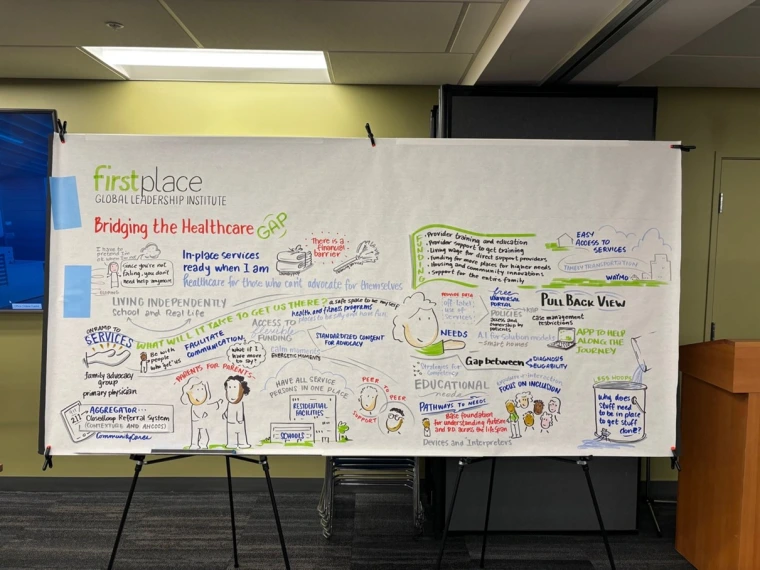The CACTI Blog: Immersing Into the Autism and Intellectual/Developmental Disability Community

By Alexia Tawrel, 2023-2024 Undergraduate Interdisciplinary Approach to Disability in Professional Practice Intern
I attended the Improving Healthcare for Adults with Autism and/or Intellectual and Developmental Disabilities (A/I/DD) event held by First Place, a global leadership institute, at the Community Foundation for Southern Arizona. This would be the first in-person A/I/DD event that I would attend for my internship. I was feeling nervous because I didn’t quite know what to expect, but I knew that this would be a great learning opportunity. It ended up being very interactive. Everybody that attended, about 10 people, would play a different societal role and engage in discussion through that perspective role. There was a sketch chat artist that drew the entire conversation (pictured below). Sketch chat art is a strategy to help individuals with Autism, ADHD, and other DDs understand the topic of conversation. Sketch chat artists create drawings based on the main ideas of discussion. I did not know what a sketch chat artist was until this event, but now I know that drawing conversation can be a helpful strategy for individuals with A/I/DD to understand topics. This ensured that everybody there could participate.
The main idea of this event was to bridge the healthcare gap for A/I/DD community members. This includes individuals with A/I/DD, caregivers, facilities, and policy personnel. A major issue for the community is transitioning from school years to living independently and having a sustainable real-work life. There is a financial barrier that prevents in-place services, such as cleaning and transportation, for those who need it. It is difficult to lose the assistance that is given by the state or an educational institute after graduating, especially for those who may need additional accessible services. Before this event, I did not know that healthcare professionals do not know about all the available resources that could be beneficial to patients and their families with disabilities. When services are unknown, or there are many hoops to go through to gain access to specific services, such as timely transportation, medical records, accessible recreational facilities, or referrals to specialists, necessary care goes unaddressed. Another area of issue is that parents and caregivers could use more support. This could be solved through circle-talk and events where they can meet, support, and learn from one another.
Overall, increasing funding to meet the needs of A/I/DD community members could help by providing training and education for healthcare providers; advocating for support to get training; increasing the living wage for direct support providers; funding for more places that provide higher needs, housing, and community innovations; and supporting the entire family as opposed to just the individual with A/I/DD. This may seem like an unattainable goal, but it is necessary for those to function successfully within society. It is going to require engagement with policymakers to close the gap between a diagnosis and eligibility. This event showed me a completely new perspective on what challenges the A/I/DD community faces. I now know what it will require to resolve some of these issues.
This event showed me the many factors that go into developing new policies and implementing them most effectively. As I plan to be a future medical professional, I now have better knowledge of different communication strategies to communicate and advocate with my patients. These types of events are crucial tool to ensure I apply the best practices when working with any individual. I want to stay up to date with the community’s needs and practice preferences so that I can make a positive impact on the healthcare world.

The CACTI Blog features the voices of our interdisciplinary trainees and Community Advisory Council members as they highlight diverse images of people with disabilities and provide community information and advocacy on disability issues. Check Out The CACTI Blog
